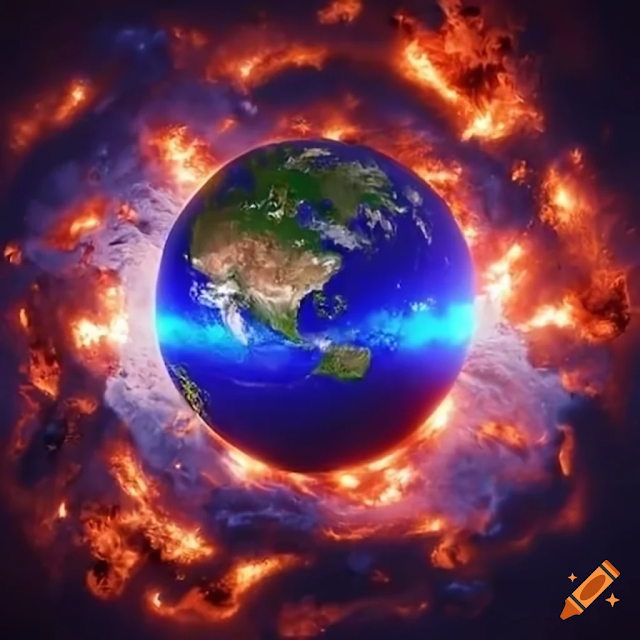The End: From Ancient Theories to Modern Insights
Introduction
The concept of "end" has fascinated humans throughout history, leading to a multitude of theories and beliefs. From ancient prophecies to contemporary news stories, the idea of "the end" has captured the imagination of individuals from all walks of life. In this article, we will explore the various theories of "end" that have emerged over time and examine the perspectives of famous individuals, scientists, and modern events that have shaped our understanding of this intriguing topic.
1. Ancient Theories of the End:
- **Apocalyptic Prophecies**: Throughout history, numerous cultures have predicted apocalyptic events, such as the Mayan calendar's supposed end in 2012 or the biblical "End of Days."
- **Comet and Eclipse Beliefs**: Ancient civilizations often associated celestial events like comets and solar eclipses with the end of the world.
- **Environmental Catastrophes**: Some ancient societies believed that environmental disasters, such as floods or earthquakes, marked the end of an era.
2. Famous Figures and Their Views:
- **Nostradamus**: The renowned French astrologer Nostradamus is famous for his cryptic prophecies, some of which have been interpreted as predicting the end of the world.
- **Isaac Newton**: The brilliant scientist Isaac Newton explored biblical texts and calculated possible end-time scenarios, though his predictions were never widely accepted.
- **Albert Einstein**: The famous physicist warned about the potential consequences of nuclear weapons, emphasizing the importance of avoiding global annihilation.
3. Scientific Insights:
- **Cosmological Theories**: Modern astrophysics and cosmology offer insights into the possible end of the universe, including scenarios like the heat death of the universe or the Big Crunch.
- **Climate Change**: Scientists today warn about the impending consequences of climate change, which, if left unaddressed, could have catastrophic effects on our planet.
- **Space Exploration**: Space agencies like NASA are studying asteroid impacts and the potential for planetary defense to prevent catastrophic events on Earth.
4. Recent News and Events:
- **Global Pandemics**: The COVID-19 pandemic raised questions about the vulnerability of our global society and the potential for widespread crises.
- **Natural Disasters**: Increasing occurrences of extreme weather events, wildfires, and earthquakes have sparked discussions about the Earth's future.
- **Artificial Intelligence**: Some experts ponder the ethical implications and risks associated with advanced artificial intelligence, imagining potential scenarios of human-made apocalypse.
5. Existential Threats:
- **Biological Weapons**: The possibility of bioterrorism and the development of deadly pathogens have raised concerns about human-made existential threats.
- **Nuclear Proliferation**: The proliferation of nuclear weapons among nations continues to be a significant concern, with the potential for catastrophic global consequences.
6. Space Exploration and Colonization:
- **Mars Colonization**: Plans for human colonization of Mars have sparked debates about the survival of humanity beyond Earth in the event of a planetary catastrophe.
- **Search for Exoplanets**: The discovery of exoplanets and the search for habitable worlds raise questions about humanity's long-term survival and potential migration to other celestial bodies.
7. Technological Advancements:
- **Artificial Superintelligence**: The idea of superintelligent machines surpassing human intelligence and the implications of such a scenario have garnered attention in recent years.
- **Biotechnology**: Advances in genetic engineering and biotechnology raise ethical questions about the potential creation of superorganisms or unforeseen consequences.
8. Environmental Conservation:
- **Renewable Energy**: The transition to renewable energy sources and sustainable practices is seen as crucial in mitigating environmental catastrophes.
- **Conservation Efforts**: Conservation initiatives aim to protect biodiversity and ecosystems threatened by human activity.
9. Interconnectedness and Global Cooperation:
- **Global Challenges**: Today, we face interconnected global challenges such as pandemics, climate change, and resource depletion. These crises emphasize the need for international cooperation and collective solutions.
- **Diplomacy and Peace**: The pursuit of diplomatic solutions and peace-building efforts remain essential in preventing conflicts that could lead to catastrophic outcomes.
10. Individual and Community Resilience:
- **Preparedness**: Individuals and communities are increasingly focused on disaster preparedness and resilience, with efforts to develop emergency plans and resources.
- **Community Support**: Building strong, supportive communities can help mitigate the impact of crises and enhance overall resilience.
11. Environmental Stewardship:
- **Conservation and Restoration**: Environmentalists and organizations advocate for the conservation and restoration of ecosystems to address the ongoing degradation of natural habitats.
- **Sustainable Practices**: Promoting sustainable practices in agriculture, industry, and daily life is crucial to reduce humanity's ecological footprint.
12. Education and Awareness:
- **Scientific Literacy**: Promoting scientific literacy and critical thinking empowers individuals to better understand and address complex issues like climate change and emerging technologies.
- **Media Responsibility**: Responsible journalism and media coverage play a significant role in disseminating accurate information and raising awareness about global challenges.
As we navigate the complexities of the modern world, we must embrace collective action, environmental conservation, technological responsibility, and the pursuit of knowledge. By working together and remaining vigilant, we can address the challenges that face us, secure a brighter future, and ensure that the concept of "the end" remains an intriguing topic for exploration rather than a harbinger of doom.


0 Comments
Please Be Kind With This Blog's Comment Section NoOne is Allowed To spam or promote any other platform Thank you for visiting